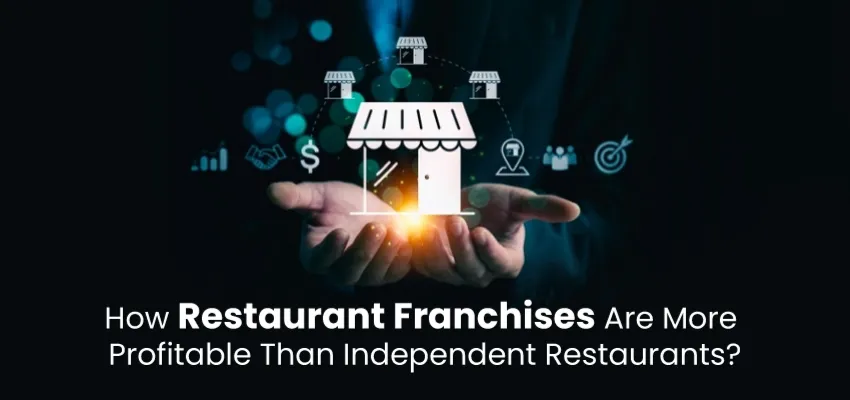
How Restaurant Franchises Are More Profitable Than Independent Restaurants
The restaurant industry is expected to grow a lot in 2025, with sales reaching new highs. However, making a profit is still tough. Higher food and labor costs, supply chain issues, and trouble finding employees are some of the main challenges restaurant owners are facing.
Imagine you’re an entrepreneur with a passion for food, eager to open your own restaurant. The prospect is exciting but also daunting. You face decisions about location, menu, staffing, marketing, and countless other details that can make or break your venture.
Now, consider another option: joining a well-established restaurant franchise. This path offers a safety net of sorts, providing you with a proven business model, comprehensive training, ongoing management support, and a recognizable brand name. This support system can be the difference between success and failure in the competitive restaurant industry.
Restaurant Franchises vs. Independent Restaurants: A Comparison
When comparing restaurant franchises to independent restaurants, several key differences and advantages emerge. These differences can significantly impact profitability and overall business success.
For entrepreneurs entering the restaurant industry, franchises offer a structured and supportive way to start. Franchising provides access to an established business model, brand strategies, and operational procedures that help new businesses succeed. On the other hand, independent restaurants often have to develop their own systems, which can be time-consuming and risky.
Benefits of Choosing Restaurant Franchises
Established Brand Recognition
One of the most significant advantages of franchising is established brand recognition. When customers see a familiar brand, they are more likely to trust the quality and consistency of the food and service. This trust translates into steady customer traffic and repeat business, which is crucial for profitability.
Proven Business Model
Franchises operate under a proven business model that has been tested and refined over time. This model includes everything from menu offerings and pricing strategies to operational procedures and customer service standards. New food franchises benefit from this wealth of experience, reducing the risks associated with starting a new business.
Brand Loyalty
Brand loyalty is another critical factor in the success of franchise restaurants. Customers often have a strong emotional connection to well-known brands, leading to repeat visits and word-of-mouth recommendations. This loyalty is a powerful driver of profitability, as it ensures a steady stream of customers.
Marketing Support
Franchisees also benefit from the marketing support provided by the franchisor. National and regional advertising campaigns, social media marketing, and promotional events are typically handled by the franchisor, allowing franchisees to focus on running their business. This marketing support helps attract new customers and retain existing ones.
Access to Bulk Purchasing
Franchises often have the advantage of bulk purchasing power, allowing them to buy ingredients and supplies at lower costs than independent restaurants. This cost-saving benefit can significantly improve profit margins. Additionally, franchises may have established relationships with suppliers, ensuring a reliable supply chain.
Training and Support
Franchisees receive extensive training and ongoing support from the franchisor. This training covers all aspects of running the business, from food preparation and customer service to financial management and marketing. The ongoing support ensures that franchisees can address any challenges they face and continuously improve their operations.
Independent Restaurants: Opportunities and Challenges
While franchises offer numerous advantages, independent restaurants also have their unique opportunities and challenges. Understanding these can help aspiring restaurateurs make informed decisions.
Creative Freedom
Independent restaurants have the creative freedom to develop their own concepts, menus, and brand identities. This freedom allows for innovation and the ability to cater to niche markets. Independent restaurateurs can create a unique dining experience that sets them apart from competitors.
Building a Local Brand
Independent restaurants can build a strong local brand by focusing on community engagement and personalized customer service. By establishing a loyal local customer base, independent restaurants can thrive even without the broad recognition of a franchise.
Financial Challenges
However, independent restaurants face significant financial challenges. Without the support of a franchisor, independent restaurateurs must secure their own financing, manage all aspects of the business, and invest in marketing efforts. These challenges can strain resources and impact profitability.
Higher Risk
The higher risk associated with independent restaurants is another factor to consider. Developing a new concept from scratch involves trial and error, and the likelihood of failure is higher compared to franchises with established business models. Independent restaurateurs must be prepared to navigate these risks and adapt quickly to changing market conditions.
Why Franchises Tend to Be More Profitable
Given the benefits and challenges of both business models, several factors explain why franchises tend to be more profitable than independent restaurants.
Economies of Scale
Franchises benefit from economies of scale in purchasing, marketing, and operations. Bulk purchasing reduces costs, while national marketing campaigns attract more customers. Streamlined operations and standardized procedures also contribute to efficiency and cost savings.
Established Customer Base
The established customer base of franchise brands ensures a steady flow of business. Customers are more likely to visit a familiar brand they trust, reducing the need for extensive marketing efforts and allowing franchisees to focus on maintaining quality and consistency.
Lower Failure Rate
The lower failure rate of restaurant franchises compared to independent restaurants is a significant factor in profitability. The proven business model, training, and support provided by the franchisor reduce the risks associated with starting and running a restaurant. Franchisees can leverage the franchisor's experience and resources to navigate challenges and achieve success.
Continuous Improvement
Franchise systems are continuously improving based on feedback and data from multiple locations. This continuous improvement ensures that best practices are shared across the network, leading to better overall performance and profitability. Independent restaurants may not have access to the same level of collective knowledge and support.
Conclusion
In the competitive restaurant industry, franchises offer several advantages that contribute to their profitability compared to independent restaurants. Established brand recognition, proven business models, brand loyalty, marketing support, access to bulk purchasing, and extensive training and support are key factors that set franchises apart.
While independent restaurants offer creative freedom and the opportunity to build a unique local brand, they face higher financial challenges and risks. Aspiring restaurateurs must carefully weigh these factors when deciding whether to pursue a franchise or an independent restaurant.
Ultimately, the choice depends on individual goals, resources, and risk tolerance. However, the structured support and established advantages of franchising make it an attractive option for many entrepreneurs seeking to succeed in the restaurant industry.
